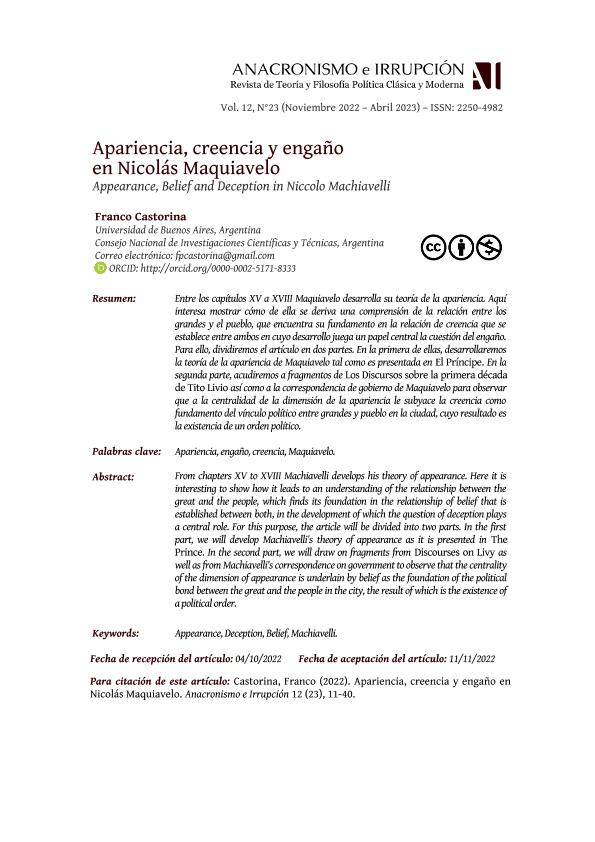Mostrar el registro sencillo del ítem
dc.contributor.author
Castorina, Franco Patricio

dc.date.available
2023-06-16T14:58:12Z
dc.date.issued
2022-12
dc.identifier.citation
Castorina, Franco Patricio; Apariencia, creencia y engaño en Nicolás Maquiavelo; Universidad de Buenos Aires. Facultad de Ciencias Sociales. Instituto de Investigaciones Gino Germani; Anacronismo e Irrupción; 12; 23; 12-2022; 11-40
dc.identifier.issn
2250-4982
dc.identifier.uri
http://hdl.handle.net/11336/200818
dc.description.abstract
Entre los capítulos XV a XVIII Maquiavelo desarrolla su teoría de la apariencia. Aquíinteresa mostrar cómo de ella se deriva una comprensión de la relación entre losgrandes y el pueblo, que encuentra su fundamento en la relación de creencia que seestablece entre ambos en cuyo desarrollo juega un papel central la cuestión del engaño.Para ello, dividiremos el artículo en dos partes. En la primera de ellas, desarrollaremosla teoría de la apariencia de Maquiavelo tal como es presentada en El Príncipe. En lasegunda parte, acudiremos a fragmentos de Los Discursos sobre la primera décadade Tito Livio así como a la correspondencia de gobierno de Maquiavelo para observarque a la centralidad de la dimensión de la apariencia le subyace la creencia comofundamento del vínculo político entre grandes y pueblo en la ciudad, cuyo resultado esla existencia de un orden político.
dc.description.abstract
From chapters XV to XVIII Machiavelli develops his theory of appearance. Here it is interesting to show how it leads to an understanding of the relationship between the great and the people, which finds its foundation in the relationship of belief that is established between both, in the development of which the question of deception plays a central role. For this purpose, the article will be divided into two parts. In the first part, we will develop Machiavelli's theory of appearance as it is presented in The Prince. In the second part, we will draw on fragments from Discourses on Livy as well as from Machiavelli's correspondence on government to observe that the centrality of the dimension of appearance is underlain by belief as the foundation of the political bond between the great and the people in the city, the result of which is the existence of a political order.
dc.format
application/pdf
dc.language.iso
spa
dc.publisher
Universidad de Buenos Aires. Facultad de Ciencias Sociales. Instituto de Investigaciones Gino Germani

dc.rights
info:eu-repo/semantics/openAccess
dc.rights.uri
https://creativecommons.org/licenses/by-nc-sa/2.5/ar/
dc.subject
APARIENCIA
dc.subject
ENGAÑO
dc.subject
CREENCIA
dc.subject
MAQUIAVELO
dc.subject.classification
Otras Ciencia Política

dc.subject.classification
Ciencia Política

dc.subject.classification
CIENCIAS SOCIALES

dc.title
Apariencia, creencia y engaño en Nicolás Maquiavelo
dc.title
Appearance, Belief and Deception in Niccolo Machiavelli
dc.type
info:eu-repo/semantics/article
dc.type
info:ar-repo/semantics/artículo
dc.type
info:eu-repo/semantics/publishedVersion
dc.date.updated
2023-06-16T12:56:40Z
dc.journal.volume
12
dc.journal.number
23
dc.journal.pagination
11-40
dc.journal.pais
Argentina

dc.journal.ciudad
Ciudad Autónoma de Buenos Aires
dc.description.fil
Fil: Castorina, Franco Patricio. Consejo Nacional de Investigaciones Científicas y Técnicas; Argentina. Universidad de Buenos Aires. Facultad de Ciencias Sociales. Instituto de Investigaciones "Gino Germani". Area Teoría Política; Argentina
dc.journal.title
Anacronismo e Irrupción
dc.relation.alternativeid
info:eu-repo/semantics/altIdentifier/url/https://publicaciones.sociales.uba.ar/index.php/anacronismo/article/view/8026
Archivos asociados
